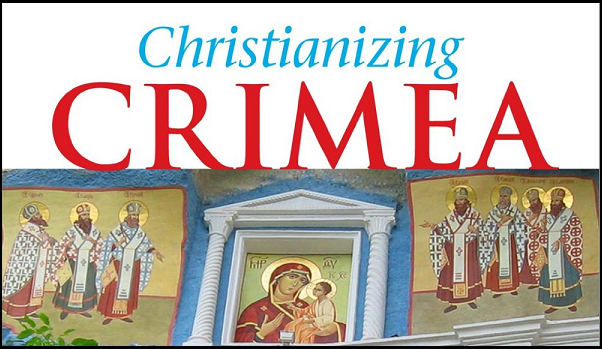[ by Charles Cameron — some more reasons to take note of the religious aspects of the Ukraine / Crimea / Russia situation ]
.
It’s not as though I can keep on top of the situation, but I can at least jot down for you some URLs that will exphasize the significnce of religious feelings and structures in the events unfolding…
**
**
Mara Kozelsky, in her book illustrated above, appears to be the go-to person for detailed background. Her Washington Post blog post, Don’t underestimate importance of religion for understanding Russia’s actions in Crimea gives us a quick overview:
Orthodox Christian nationalism has been on the rise in Russia from the collapse of the Soviet Union. The close relationship between Russian church and state is everywhere evident, from the persistent refusal to allow the pope onto Russian soil, the ejection of the Salvation Army from Moscow in 2001 and the subsequent restrictions placed on Protestant missions. Patriarch Kirill has inserted himself more visibly in Russian politics than his predecessor, Patriarch Aleksei. The prosecution of Pussy Riot for performing in an Orthodox church as well as dismaying anti-homosexual legislation reflects a new stage in the evolution of Russia’s deeply conservative Orthodox identity. As the so-called “Cradle of Russian Christianity,” Crimea fits into this trajectory too.
Theocratic notions of Russian identity date to the Byzantine theory of Symphonia, in which the church and the state should ideally function as distinct but harmonious entities. Early Russian Tsars who portrayed themselves as divine right rulers, and Russian state theorists promoted Moscow as the Third Rome. After the fall of Rome to Visigoths and then Byzantium to the Ottomans, it was left up to Russia, according to this idea, to preserve the one true faith. As Western governments separated church from state, Russia moved in the other direction. Nicholas I (1825-1855), the Tsar famous for suppressing the Hungarian Revolution and fighting the Crimean War, summarized Russia’s church-state identity in the phrase “Orthodoxy, Autocracy, Nationality.” This trinity became the guiding concept of Russian national identity through the Russian Revolution of 1917.
Crimea sits at the heart of both the Third Rome idea and Nicholas I’s nationality platform, because it was on the peninsula that Byzantium passed the mantle of Orthodoxy to Russia. In the ancient Greek colonial city of Chersonesos, the Byzantine emperor baptized the Kyivan Rus Prince Vladimir. Prince Vladimir’s conversion has been described by an early Russian nationalist as “the most important event in the history of all Russian lands,” because the conversion “began a new period of our existence in every respect: our enlightenment, customs, judiciary and building of our nation, our religious faith and our morality.”
As you’d expect, there’s more.
**
Picking up, we have a Religion News Service piece from Sophia Kishkovsky: Ukrainian crisis may split Russian Orthodox Church:
Russia has prided itself on its revival of Orthodox Christianity after decades of Soviet persecution, but a war with the Ukraine could splinter the Russian Orthodox Church.
That church has its roots in Kiev, where Prince Vladimir baptized his people as Christians in 988, an event viewed as a cornerstone of Russian and Ukrainian identity. It has even deeper roots in Crimea, where, according to legend, Vladimir was himself baptized by Byzantine emissaries.
The Ukrainian Orthodox Church of the Moscow Patriarchate, which has 12,500 congregations, is the largest of three Orthodox churches in Ukraine.
But while it has some degree of autonomy, with a Synod of Bishops that elects its own members, the church’s leader, currently Metropolitan Onufry of Chernovtsy and Bukovina, although elected by the synod, has to be approved by Moscow.
In his sermon at the end of the service at Christ the Savior Cathedral in Moscow on Friday (March 14), Kirill, who has been known for his support of Russian President Vladimir Putin, suggested that Ukraine has a right to self-determination.
But he also stressed that it must not be trapped into a spiritual division from Russia.
**
And you may or may not have seen this already, but there’s also a potential jihadist angle to complicate things even further, as explored almost a week ago in a Financial Times piece by Guy Chazan — Tatars warn Russia risks provoking jihadi backlash in Crimea:
Mustafa Jemilev, a member of the Ukrainian parliament, said a number of militant Tatars had approached him to say they would fight the Russians.
“We have Islamists, Wahhabis, Salafis … groups who have fought [with the opposition] in Syria,” he said in an interview in Simferopol, the Crimean capital. “They say: ‘an enemy has entered our land and we are ready’. We can’t stop people who want to die with honour,” he said, making he clear he did not endorse a jihadist campaign.
The warning underscores the potential dangers facing Moscow as it tightens its grip on Crimea. A referendum on whether Crimea should become part of Russia has been scheduled for next Sunday. Annexation of Crimea would not only exacerbate the east-west crisis triggered by Russia’s occupation of the peninsula, but could also deepen ethnic and religious divisions in Crimea itself, increasing the risk of communal strife and even armed conflict, local leaders say. Opposition to Russia is most intense among the Crimean Tatars, a Muslim minority who number about 280,000 and make up roughly 12 per cent of the region’s population.
**
h/t Cheryl Rofer



